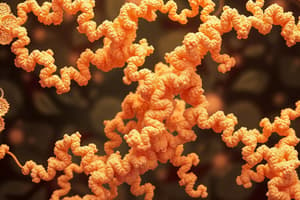Podcast
Questions and Answers
What determines the amino acid sequence in a protein?
What determines the amino acid sequence in a protein?
- The DNA coding (correct)
- The binding capacity of the protein
- The molecular structure of the protein
- The type of amino acids present
What is the primary structure of a protein responsible for?
What is the primary structure of a protein responsible for?
- Determining the protein's tertiary structure
- Determining the protein's molecular structure and identity (correct)
- Determining the protein's recognition capacity
- Determining the protein's binding capacity
What is the secondary structure of a protein characterized by?
What is the secondary structure of a protein characterized by?
- The quaternary structure of the protein
- The covalent bonds between amino acids
- The 3-dimensional shape of the protein
- The interaction of adjacent amino acids (correct)
What is the quaternary structure of a protein?
What is the quaternary structure of a protein?
What is the function of enzymes in the body?
What is the function of enzymes in the body?
What is the function of antibodies in the body?
What is the function of antibodies in the body?
What is the result of denaturation of proteins?
What is the result of denaturation of proteins?
What is the characteristic of globular proteins?
What is the characteristic of globular proteins?
What is the origin of the term 'protein'?
What is the origin of the term 'protein'?
What is the general composition of proteins?
What is the general composition of proteins?
What is the primary function of antibodies in the body?
What is the primary function of antibodies in the body?
How many different amino acids are essential for adults?
How many different amino acids are essential for adults?
What is the term for the electric charge of amino acids depending on the pH of the solution?
What is the term for the electric charge of amino acids depending on the pH of the solution?
What is the primary determinant of a protein's function?
What is the primary determinant of a protein's function?
What is the byproduct of the formation of a peptide bond?
What is the byproduct of the formation of a peptide bond?
What is the approximate number of different proteins found in the human body?
What is the approximate number of different proteins found in the human body?
Flashcards are hidden until you start studying
Study Notes
Proteins
- Proteins are versatile molecules in the body with numerous functions.
- The term "protein" comes from the Greek word "Proteus," meaning "primary."
- Proteins are polymers of amino acids, composed of 20 different amino acids in varying numbers and sequences that are covalently linked.
- The general formula for proteins is CHON.
Functions of Proteins
- Repair and maintain body tissues.
- Important in blood coagulation and immunologic function.
- Transport metabolic substances.
- Maintain osmotic pressure and blood pH.
- Act as biocatalysts.
Amino Acids
- Amino acids are large molecules (macromolecules) and the fundamental building blocks of proteins.
- There are 20 different amino acids, with 8 essential amino acids that cannot be produced by the body and must be supplied through diet.
- The essential amino acids are:
- Valine
- Leucine
- Isoleucine
- Phenylalanine
- Tryptophan
- Methionine
- Threonine
- Lysine
Characteristics of Amino Acids
- Amino acids have an electric charge that depends on the pH of the solution and the type of R group.
- In basic solutions, amino acids have a negative charge, while in acid solutions, they have a positive charge.
- This charge affects how proteins move in an electric field, allowing them to be separated.
Protein Structure
- The structure of a protein dictates its function.
- The primary structure of a protein refers to the number and sequence of amino acids, which is determined by the DNA coding.
- The primary structure determines the identity of proteins, molecular structure, binding capacity, and recognition capacity.
- The secondary structure of a protein refers to the coiling and folding of the protein chain, determined by the interaction of adjacent amino acids.
- The tertiary structure of a protein refers to the 3-dimensional shape governed by various covalent and non-covalent bonds.
- The quarternary structure of a protein refers to the combination of two or more polypeptide chains that associate closely together.
Classes of Proteins
- Enzymes: biochemical catalysts that accelerate or decelerate biochemical reactions.
- Structural proteins: provide structural support for the body, a tissue, or a cell, and are usually long, fibrous molecules.
- Contractile proteins: involve in the contraction and relaxation of muscles, allowing movement of individuals, and are usually long, fibrous materials.
- Antibodies: proteins produced by certain immune cells that effectively neutralize foreign material.
Studying That Suits You
Use AI to generate personalized quizzes and flashcards to suit your learning preferences.



